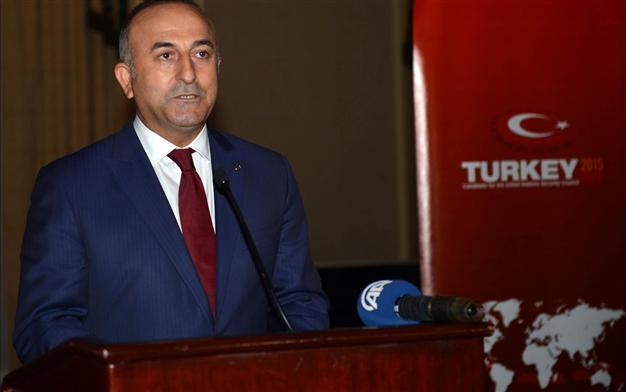Turkey in last-minute lobbying for UN Security Council bid
NEW YORK - Anadolu Agency

Turkish Foreign Minister Mevlüt Çavuşoğlu intensified his contacts on the home stretch for the UN Security Council elections. AA Photo
Turkey concluded its campaign for the U.N. Security Council elections with a reception on Oct. 15 hosted by Foreign Minister Mevlüt Çavuşoğlu in New York."Tonight marks the last checkpoint in our journey towards the United Nations Security Council elections for the 2015-2016 term," Çavuşoğlu said in a speech at the event, referring to the U.N. General Assembly vote on Oct. 16 that will elect five countries to serve in the chamber for a two-year period beginning on Jan. 1, 2015.
The U.N. Security Council seats are allocated by region, and candidates require a two-thirds majority of votes from the 193 U.N. member states.
Turkey is part of the "Western European and Others Group," in which it is competing with New Zealand and Spain for a seat. A total of two seats are allocated for the group, while one seat each is allotted for the African, Asia-Pacific, Eastern European, and Latin American and Caribbean groups.
Earlier in the day, Çavuşoğlu met the U.N. representatives of the world's least developed countries, known as LDCs, at a launch event organized by an international group monitoring the implementation of the Istanbul Program of Action, a strategic plan adopted by the Fourth U.N. Conference on the Least Developed Countries in 2011.
"The Istanbul Program of Action sets the ambitious target of halving the number of LDCs to meet the criteria of graduation by 2020," Cavusoglu said, adding that fulfilling this aim will bring about structural, economic and social transformation for these countries.
There are currently 48 countries designated by the United Nations as least developed countries.
"Turkey remains committed to supporting LDCs in their efforts to graduate from LDC status," Çavuşoğlu said.
Countdown begins
The Security Council is comprised of 15 members, with five permanent members - the U.S., the U.K., Russia, China and France - having the right of veto.
Turkey has frequently criticized the structure of the U.N. Security Council and what it sees as the disproportionately strong decision-making capabilities of the permanent members.
Turkey served in the Security Council as a non-permanent member in 1951-1952 and 1954-1955, and in 1961. It was most recently elected in 2009-2010 after an absence of almost 50 years.
In its official brochure promoting its bid for the election, Turkey pledges to "voice the views of those which go unheard," contribute to the peaceful resolution of conflicts and peacekeeping, bolster international efforts to combat terrorism and organized crime and to play a facilitating role in regional issues.
The new non-permanent members will replace Argentina, Australia, Luxembourg, South Korea and Rwanda. The other five non-permanent members still serving are Chad, Chile, Jordan, Lithuania and Nigeria.
















